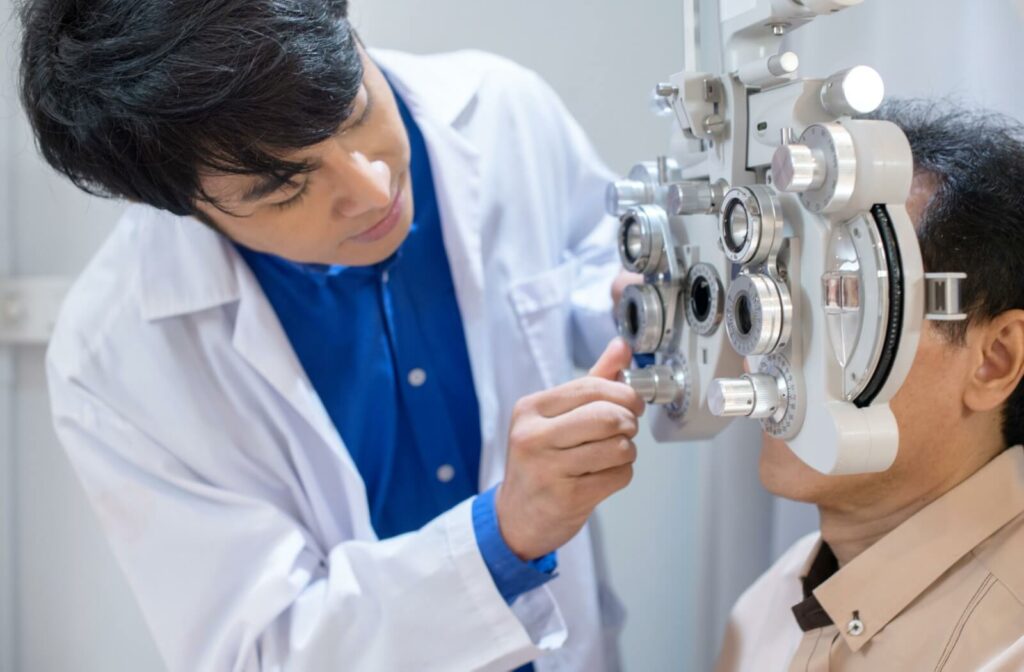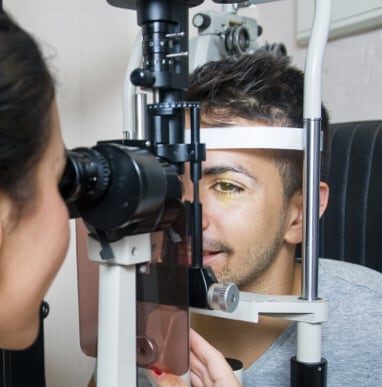Your eyes can provide valuable clues about your overall health, often signaling underlying conditions long before other noticeable symptoms arise.
Although many people schedule eye exams primarily for vision correction or prescription updates, these visits can also detect signs of significant health issues, including diabetes, high blood pressure, high cholesterol, and autoimmune diseases.
Understanding what your eyes might communicate about your health is essential for early intervention and prevention. Making regular eye exams part of your healthcare routine can protect your vision and support your overall well-being.
Diabetes & Eye Health
Diabetes is one of the most common health conditions that optometrists can detect through an eye exam. It occurs when your blood sugar levels remain consistently high, potentially damaging blood vessels throughout your body, including those in your eyes.
Diabetic Retinopathy
Diabetic retinopathy occurs when elevated blood sugar damages the blood vessels in the retina, causing leaks or abnormal growth. The condition often has no noticeable symptoms in its early stages. However, your optometrist can detect potential signs during a dilated eye exam.
Early identification of diabetic retinopathy helps manage diabetes more effectively, preventing vision loss and other complications.
High Blood Pressure & Eye Health
Another condition often revealed through eye exams is hypertension (high blood pressure). Just like diabetes, hypertension affects blood vessels and may lead to noticeable changes in the eyes.
Hypertensive Retinopathy
Hypertensive retinopathy results when high blood pressure damages retinal blood vessels. Your optometrist might notice narrowed blood vessels, retina bleeding, or optic nerve swelling.
These early warning signs can prompt further medical assessment and necessary treatments, reducing your risk of cardiovascular diseases and stroke.
High Cholesterol & Eye Health
You might not associate cholesterol with your vision, but high cholesterol levels can also affect your eyes, specifically your corneas and retinal blood vessels.
Arcus Senilis & Retinal Embolism
High cholesterol can cause arcus senilis, a white or grey ring around the cornea’s outer edge. While arcus senilis can be harmless in older adults, it may signal high cholesterol levels in younger individuals.
Additionally, your optometrist may spot signs of retinal embolism—small cholesterol plaques blocking blood flow in the retinal vessels—which can indicate cardiovascular risks and prompt further medical investigation.
Autoimmune Diseases & Eye Health
Several autoimmune diseases can have early signs that appear in your eyes. These conditions cause your immune system to mistakenly attack healthy tissues, sometimes resulting in ocular inflammation.
Dry Eye Syndrome & Sjögren’s Syndrome
Persistent dry eyes may indicate an autoimmune condition like Sjögren’s syndrome, which causes reduced tear production.
Your optometrist can help treat chronic dry eye. They may also recommend additional medical evaluations to confirm or rule out an autoimmune condition based on other identified factors.
Uveitis, Rheumatoid Arthritis, & Ankylosing Spondylitis
Uveitis (inflammation of the eye’s middle layer) is commonly associated with autoimmune diseases such as rheumatoid arthritis and ankylosing spondylitis. Symptoms include redness, eye pain, blurred vision, and sensitivity to light.
Early detection through routine eye exams can facilitate prompt treatment, reduce discomfort, minimize inflammation, and help preserve your vision.
Thyroid Disease & Eye Health
Thyroid dysfunction frequently presents with unique eye symptoms. Both hyperthyroidism (overactive thyroid) and hypothyroidism (underactive thyroid) can affect your eyes, alerting your optometrist to potential hormonal imbalances.
Graves’ Disease & Thyroid Eye Disease
Graves’ disease, an autoimmune thyroid condition, often presents eye-related symptoms, including bulging eyes, irritation, or double vision. An eye exam can help identify these symptoms early, enabling prompt medical treatment to preserve your long-term vision.
Neurological Conditions & Eye Health
Eye exams can also uncover neurological issues because the optic nerve connects your eyes directly to your brain. When you experience changes in your vision, pupil response, or optic nerve function, these symptoms can indicate a neurological disorder.
Multiple Sclerosis
Multiple sclerosis (MS), a neurological disease affecting the central nervous system, often presents early symptoms such as optic neuritis—an inflammation of the optic nerve.
Your optometrist may notice signs of optic nerve inflammation or abnormal pupil responses, prompting further neurological evaluation.
Brain Tumors & Aneurysms
Although uncommon, optometrists occasionally discover signs of brain tumors or aneurysms during routine exams.
Pressure on the optic nerve or abnormal pupil responses can signal underlying neurological issues, underscoring the importance of regular eye exams as part of preventative healthcare.

Why Are Regular Eye Exams Important?
Regular, comprehensive eye exams provide valuable insight into your overall health. Your eyes can often show the initial signs or symptoms of a wide range of health conditions. Even if your vision seems perfect, hidden health issues might develop silently.
Routine eye exams are recommended every 1–2 years for most adults, depending on age, risk factors, and current eye health. For individuals with diabetes, hypertension, autoimmune conditions, or a family history of these diseases, more frequent eye exams may be necessary.
Maintaining Eye Health
Beyond regular exams, practicing good eye care habits also supports overall health:
- Eat a balanced diet rich in omega-3 fatty acids, vitamins, & antioxidants
- Use sun protection & wear sunglasses with UV protection to prevent sun-related eye damage
- Manage screen time by taking regular breaks from screens to reduce digital eye strain & maintain comfort
Your Partner in Protecting Your Vision & Wellness
Your eyes offer more than the ability to see—they can serve as early warning signs that help you protect your overall health. You’re proactively prioritizing your wellness with your vision care.
At Vision Care Center, conveniently located in Peoria and Washington, IL, we provide comprehensive eye exams designed to help detect early signs of health conditions, safeguarding your vision and overall health. Schedule your appointment today.












